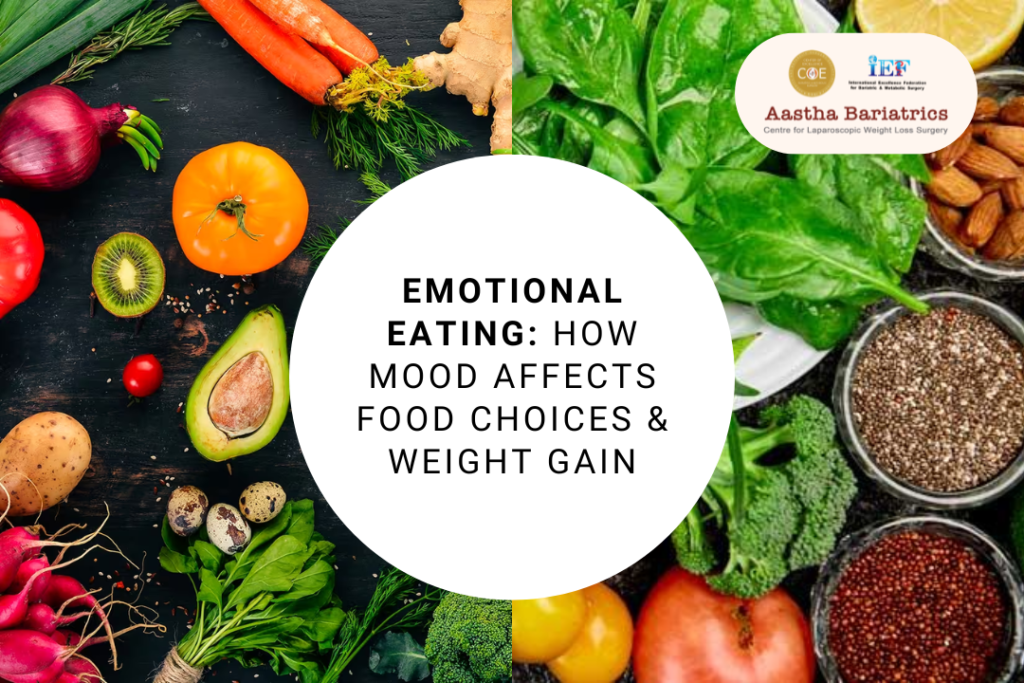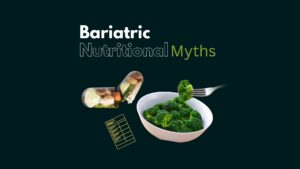
Vidhi Dave
Bariatric Dietician & Content Writer

Emotional Eating: How Mood Affects Food Choices & Weight Gain

Burger or pizza might be your preferred food when you’re happy, ice cream or cookies might be your go-to treat when you’re sad, and potato chips might be your go-to snack when you’re bored. Food not only satisfies our stomachs; it also satisfies our emotions. Emotional eating occurs when people use food to cope up with emotions rather than to fulfil hunger. When people are upset, lonely, depressed, anxious, or bored, they frequently switch to food. Unfortunately, if emotional eating is not adequately managed, it can result in obesity and other health problems.
Emotional Eating: Psychological factors, rather than actual hunger, frequently drive emotional eating. When people are distressed or upset, for example, they may turn to food for comfort and distraction. Eating releases neurotransmitters, such as serotonin, dopamine being temporarily released, which reduces emotional suffering. Though relief is temporary, emotional eating can eventually result in a vicious cycle of unhealthy eating patterns and unfavorable feelings.
Food for Mood: Food preferences are significantly influenced by mood. People frequently seek “comfort foods,” also known as high-calorie, high-sugar, or high-fat foods, when they are anxious or depressed. These foods often evoke pleasant feelings and memories, bringing about a sense of pleasure or nostalgia. Consuming these foods, however, might result in weight gain and guilt. There are 5 emotions which can lead to overeating:
Boredom: One of the most frequent triggers of emotional eating, which can also result in binge eating, is when you eat because you’re bored. The temptation to eat out of boredom is a strong emotion that frequently causes an urge for a certain meal.
Stress: Stress might cause us to binge consume anything we see. Fast food in particular can become our go-to diet, which can result in significant weight gain.
Loneliness: As people may spend more time alone when they are lonely, it might lead to a sedentary lifestyle. An insufficient or poor-quality night’s sleep might result from loneliness. Hormones that regulate hunger, such as ghrelin and leptin, can be impacted by sleep loss. These hormonal imbalances have the potential to cause overeating and weight gain by boosting cravings and hunger.
Happy: Sometimes, happiness can result in a relaxed state of mind and a carefree attitude, which might lead to overindulging in food and beverages. People frequently overeat or consume excessive amounts of calories when celebrating or when they are feeling cheerful, which can lead to weight gain if it becomes a habit.
Anger: Regular eating habits can be disturbed by anger. When angry, some people may miss meals or eat inconsistently, which might cause them to overeat later or to make less healthful food choices.
Link between emotional eating and weight gain: First, emotional eaters frequently overeat in comparison to what their bodies require, which creates an imbalance of energy. Second, emotional eaters frequently select calorie-dense, nutrient-deficient foods, which can result in weight gain and nutritional inadequacies. The body’s hunger and satiety signals may also be disrupted by emotional eating, making it challenging to control food consumption and keep a healthy weight.
Strategies to Break the Cycle of Emotional Eating:
Grab a glass of water: It can be one of the oldest ways to calm down yourself, but it can really help the person who is stressed or frustrated. Since many people don’t get enough water, they may mistake thirst for other conditions like hunger or extreme stress.
Don’t skip a meal: In example, cravings for high-calorie and unhealthy foods can develop as a result of skipping meals. When the body lacks regular nutrition, it naturally looks for rapid sources of energy, frequently in the form of fatty or sugary foods.
Distract your mind: Try a yoga routine or go for a run or walk outside if you’re feeling anxious. Alternately, dance around your room while listening to cheerful music until the temptation to eat fades.
Exercise: It has been demonstrated that exercise, particularly walking, lowers stress levels. The desire to eat for comfort or stress reduction reduces as stress levels rise. You can relax and practice meditation while walking, which can help you better manage your stress.
Write it down: The feelings or occasions that make you want to eat, write them down. A mood and food journal is one of the best tools for staying on track with things. Record your meal’s ingredients, serving size, mood (such as bored, pleased, anxious, sad, or angry), and the circumstances leading up to it. Are you merely eating to feel better, or were you actually hungry? You’ll start to see trends in your eating and feeling habits if you keep a notebook. Making smarter decisions is possible with the use of this knowledge (for example, deciding against a bag of chips in exchange for a walk around the block to clear your thoughts).
Emotional eating is a typical reaction to negative emotions, yet it can be harmful to one’s weight control and general health. People can start developing healthy coping methods by becoming aware of the connection between mood, dietary decisions, and weight gain. It is possible to escape the pattern of emotional eating and establish a healthy relationship with food via self-knowledge, support, and mindful eating techniques. This will enhance both physical and emotional well-being.







